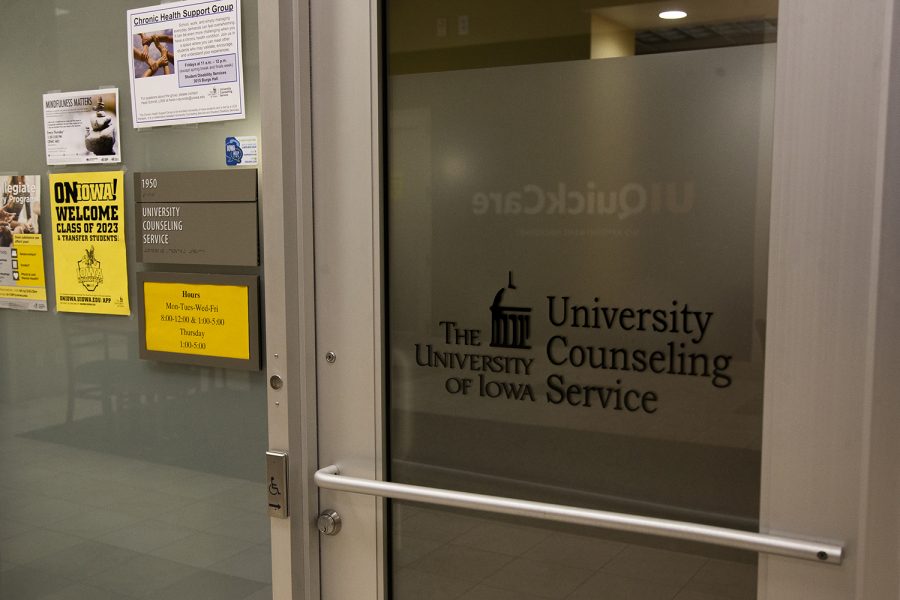UI students advocate for bill that would allow K-12 students excused mental-health days
The University Counseling Services office is seen in the Old Capital Mall on Monday, February 17, 2020.
February 19, 2020
Two University of Iowa nursing students are urging Iowa lawmakers to pass a bill that would allow K-12 students to have excused mental-health days with a goal to promote student wellness and improve the state of Iowa’s mental health-care system.
College of Nursing seniors Grace Anderson and Hannah Ingle have devoted their time to raising awareness about mental-health days and lobbying state legislators to enact the bill, Senate File 2067, which would provide a total of three excused absences for the school year.
Anderson said that the bill would mainly pertain to K-12 students. The two said they believe that increasing communication, decreasing the stigma associated with mental health, and providing students with resources at a young age can positively impact their future.
“We are advocates for mental health, and we see a need for change in our current education system,” Anderson said. “We have seen firsthand the increase in prevalence of mental illnesses, especially in children and adolescents, and with Iowa’s mental health-care system ranking one of the worst in the country, allowing students three mental-health days would be a step in the right direction.”
A 2017 report from the Treatment Advocacy Center gave Iowa a grade of D- grade for its mental-health bed shortage and also marked Iowa’s treatment of prisoners with mental illnesses low.
This bill will prevent the onset or exacerbation of mental illness by allowing students to take the time they need to focus on their mental-health needs, Anderson said. Additionally, the team said allowing mental-health days would reduce the negative stigma associated with mental illnesses by equalizing the importance of mental health and physical health.
The measure has been assigned a subcommittee, but a full committee needs to approve the bill before Friday in order for the proposal to continue in the legislative process. Iowa’s chapter of the National Alliance on Mental Illness and the organization Iowa Mental Health Advocacy are both registered in favor of the bill.
Ingle said there is a rising number of mental illness cases among adolescents in this generation and that there is extra stress and expectations that students need to deal with from technology, social pressures, extracurriculars, and more.
RELATED: Mental-health resources scarce at UI Stead Family Children’s Hospital, researchers say
Right now, Ingle said, SF 2067 allows three excused absences a school year because of mental-health reasons. After each day is used, a teacher, counselor, or nurse would be required to check in with the student, assess the situation, provide support, and intervene with more resources.
“Just like with a physical illness, a student may need more than three days for mental-health reasons,” Ingle said. “Providing resources for mental health is very needed and could help to prevent serious outcomes of mental illness.”
Anderson said school counselors intervening after four days will assure that students do not abuse the exemptions.
Anderson also said, some students’ parents already call them in with the flu from school when they’re taking a day off for their mental health. Mental-health days would make sure students and parents do not have to lie to schools in order to get the break they need, she added.
“The brain is a complex organ, just like the heart and the rest of the organs in the body. When the brain is interrupted by mental-health issues, it may cause a constant firing of a response or a change in neurotransmitters causing an interruption in students thinking process,” Anderson said.
University Counseling Services Director Barry Schreier said he recently completed a study that showed how students who attended counseling services improved their performance in school.
“In addition to the benefits to attending counseling services during one’s college career, research shows that many students show up to campus with preexisting mental-health concerns rather than developing them once they reach the university,” Schreier said.
There is a hope to improve metal health if it’s focused on earlier, Shreier added, and mentioned the UI has made significant strides to care for the mental health of those on campus.
The UI in the last few years added counseling staff members and increased mental-health services for students. There is a student mental-health fee, Schreier said, which helps to meet UI students’ mental-health needs.
They are currently spreading awareness about mental-health days and the increasing prevalence of poor mental health in children and adolescents, and have reached out to organizations and others affected by mental illnesses. The bill is currently in the Senate and they hope it will pass this spring, Anderson said.
“Without this bill, who knows what could happen with students,” Anderson said. “In the end, we believe that a mental illness like depression can be just as debilitating as a physical illness like the flu. This simple act has the power to save lives.”














